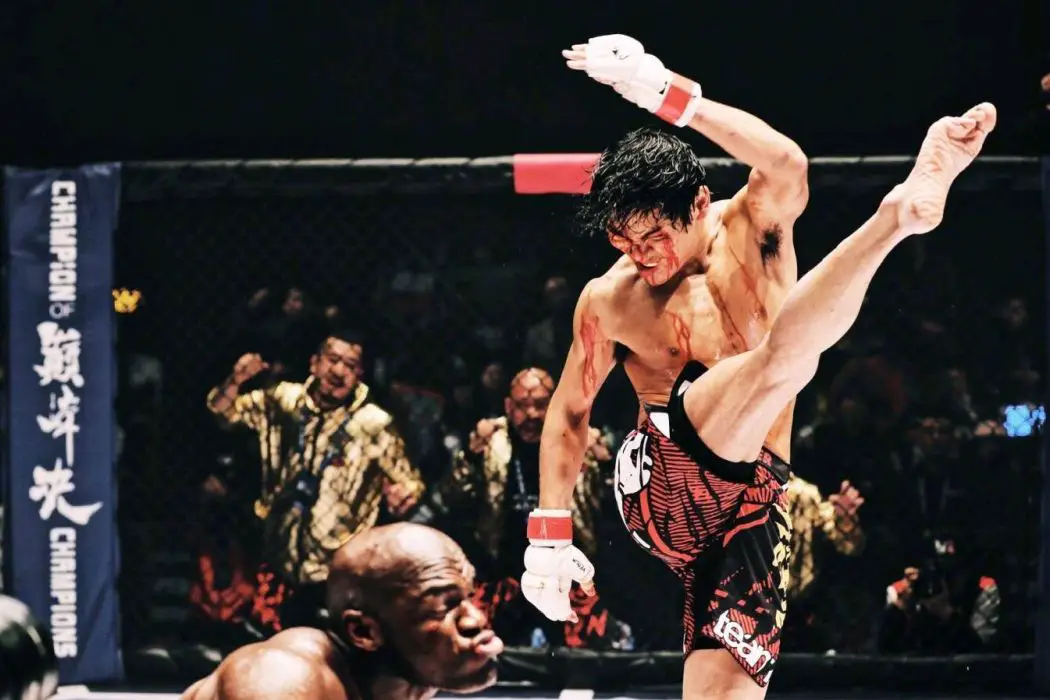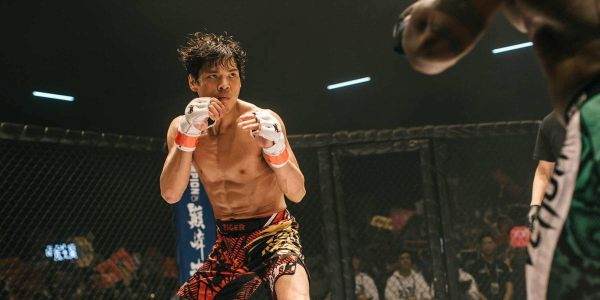Far East Film Festival 2020: CHASING DREAM

Wilson is a cinema enthusiast based out of Toronto, Canada.…
Given Johnnie To’s illustrious filmography since the late 1990s, it’s hard to believe that the release of Chasing Dream marked a three-year gap since his last directorial effort. And while his last two films – Office and Three – veered away from the usual stylistic markings one has come to expect from a Milkyway Image production, Chasing Dream certainly feels like a slight return to form for the ageing auteur. The film also marks a rare crossover into China for To, which may be a sign of the times that is sure to ignite mixed feelings amongst fans of local Hong Kong cinema.
Set within an urbanized city in China, the film follows MMA fighter Tiger (Jacky Heung) and aspiring singer Cuckoo (Keru Wang). As Cuckoo becomes knee-deep in debt with a local loan shark, she forms an unexpected relationship with Tiger, who is supposedly responsible for collecting this debt. This budding relationship takes the duo across the city touring various singing and fighting competitions, all while utilizing musical numbers to advance the film’s storyline.
A tale of misguided ambition
On the surface, Chasing Dream positions itself as a film about dreamers who seemingly get lost in their own craft. It’s a narrative that we’ve seen time and again, particularly in films where the craft in question is performance-based. But on closer observation, the film subverts this familiar tune by redefining what it actually means to have a dream.
Despite advancing in their respective careers of MMA fighting and signing, both Tiger and Cuckoo’s successes fall short of the personal gratification that dreamers yearn for. And the emptiness of their pursuits illustrate a tale of misguided ambition, rather than one of realized dreams. To and his talented team of writers hammer in this point by utilizing external validation as a marker of success for its two protagonists. Having an audience constantly judge their work in the arena and on the stage, their successes and failures are dependent on others, which only adds to the misguided nature of their ambitions.
But by the end of the film, it’s clear that the dreamer mentality actually comes from within, and any sentiment of external validation is simply a secondary outcome. For both Tiger and Cuckoo, their internal drive to dream really comes from love, and that is perhaps the film’s most affecting message.
A frustratingly unique blend of genres
International audiences who are mostly familiar with To’s more ‘serious’ films about the triad underworld will likely be surprised with how aloof Chasing Dream can feel at times. But anyone familiar with his full body of work will know that To has a fairly dynamic range as a filmmaker, especially when he collaborates with Wai Ka-Fai. In fact, To has previously charted the film’s many different genres, including its musical (Office), romantic comedy (too many to list), triad lifestyle (again, too many to list) and competitive fighting (Throw Down) elements, throughout his career.

That being said, the decision to blend in so many different genres into a single film doesn’t provide the level of creative buoyancy that was likely hoped for. While this mishmash of cinematic elements does result in an entertainingly kinetic viewing experience, it also causes the film to lose its narrative focus at times. This was perhaps intended as a way to align viewers with the side-tracking mindset of the film’s characters, but unfortunately only serves as a distraction. In isolation, the romantic comedy and musical elements work quite well, and the film might have been better served if To had just focused on these two genres (like he did with Office).
The problem with the auteur theory
While I certainly have respect for film theory and understand the (historical) importance of the auteur theory, particularly when it comes to film criticism, I must concede that it continues to be a concept that frustrates me on many different levels. And this frustration is most evident when it comes to a filmmaker like Johnnie To, who is arguably one of the most versatile auteurs working in modern cinema. Finding a way to neatly contextualize a film like Chasing Dream to his greater body of work is really an impossible task, and one has little to gain from examining his films in this manner.

Speaking from the perspective of someone who is an avid fan of the director (and full disclosure, even named his own website after a Johnnie To film), my all-time favourites from his filmography would include; Love on a Diet (a highly commercial romantic comedy starting two Hong Kong superstars in fat suits), Throw Down (a story set within the underground judo world that also serves as a homage to Akira Kurosawa) and The Mission (a quiet, yet serious film about a triad assassination attempt). Bullets and gangster lifestyles aside – which is still what To is generally known for – his filmography can often be hard to pinpoint when it comes to his narrative and stylistic choices.
This lack of unity when evaluating his films as a collective is actually what makes To such an admirable filmmaker. Even though Chasing Dream might appear to fall outside of his ‘usual’ style of filmmaking, it’s actually quite fitting because there’s really nothing usual about his films in the first place.
Final Thoughts
Those expecting Chasing Dream to be a quintessential ‘Johnnie To film’ will likely be disappointed, as this is simply not one of those films. On a personal note, I found the film’s setting outside of Hong Kong and being essentially void of any actors from the territory to be a disheartening experience. While other locally enthusiastic filmmakers from Hong Kong have (and continue to) venture into making films in China, To has always just felt inherently rooted within the industry. Even during his previous outings into China (Drug War being the most prominent one), he would still utilize thespians from Hong Kong, which makes Chasing Dream feel like his first complete departure from the local cinema landscape.
Having said that, this is just one film, and what To does this coming decade is anyone’s guess. And my personal sentimentalities aside, Chasing Dream does have a lot of the trademark technical and narrative notes that seem fitting of a To-helmed Milkyway Image production. The film also demonstrates that the ageing filmmaker is still attempting to reach beyond his own comfort zone, which is certainly an exciting thing for the world of cinema. Here’s hoping that To continues to have such creative ingenuity and that his next outing will fall back on more familiar locale. One can dream, right?
Watch Chasing Dream
Chasing Dream was initially released in Asia back in November 2019, and recently screened as part of the Far East Film Festival. There are currently no VOD or additional release plans for the place.
Does content like this matter to you?
Become a Member and support film journalism. Unlock access to all of Film Inquiry`s great articles. Join a community of like-minded readers who are passionate about cinema - get access to our private members Network, give back to independent filmmakers, and more.
Wilson is a cinema enthusiast based out of Toronto, Canada. He escapes from his day job by writing random thoughts about cinema on the internet. Although he has a longstanding penchant for Hong Kong cinema, he considers himself to be an advocate for Asian cinema in general. He has been attending the Toronto International Film Festival every year since 2005, and more of his work can be found on his website: www.wilson-kwong.com.













